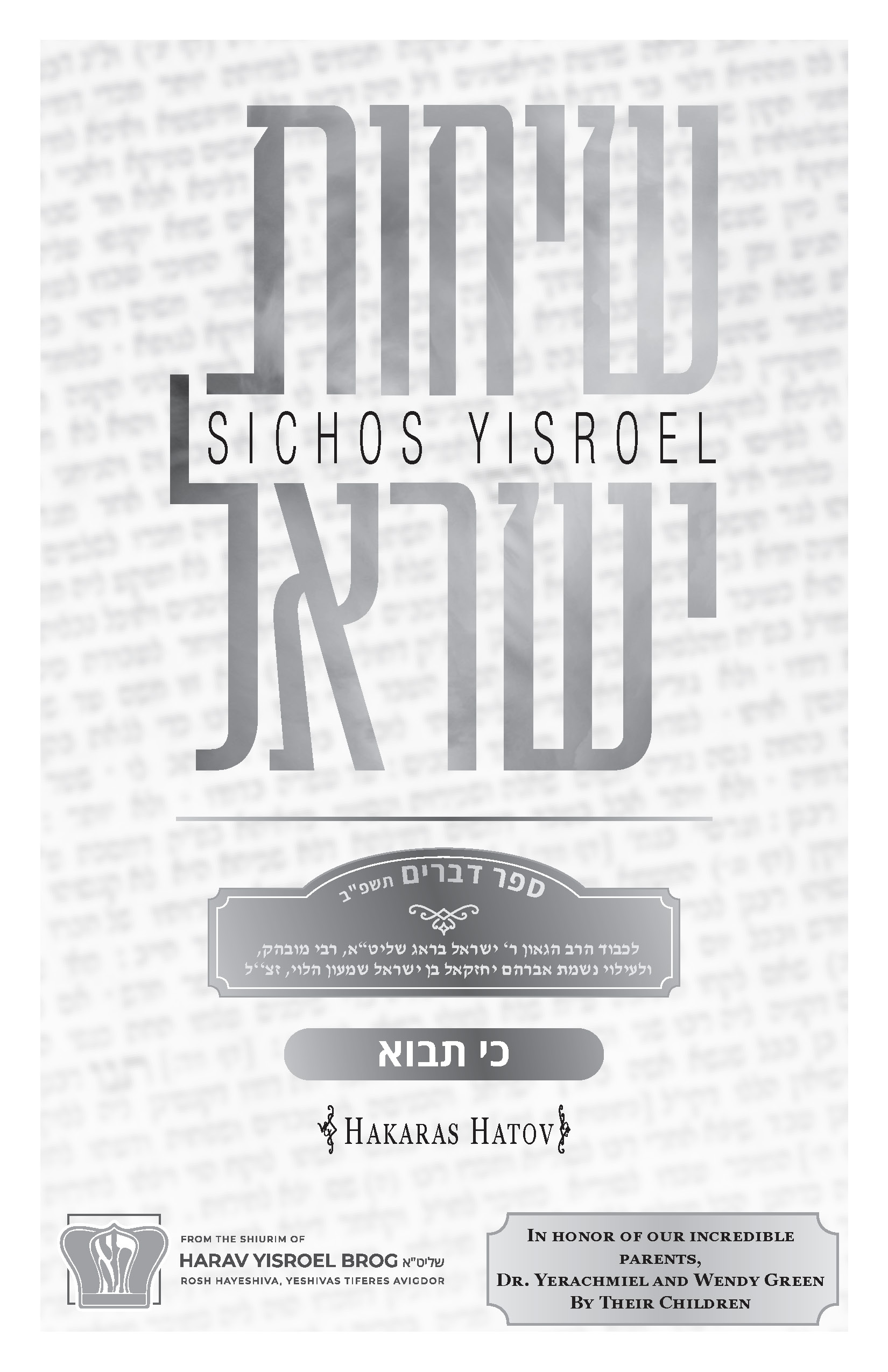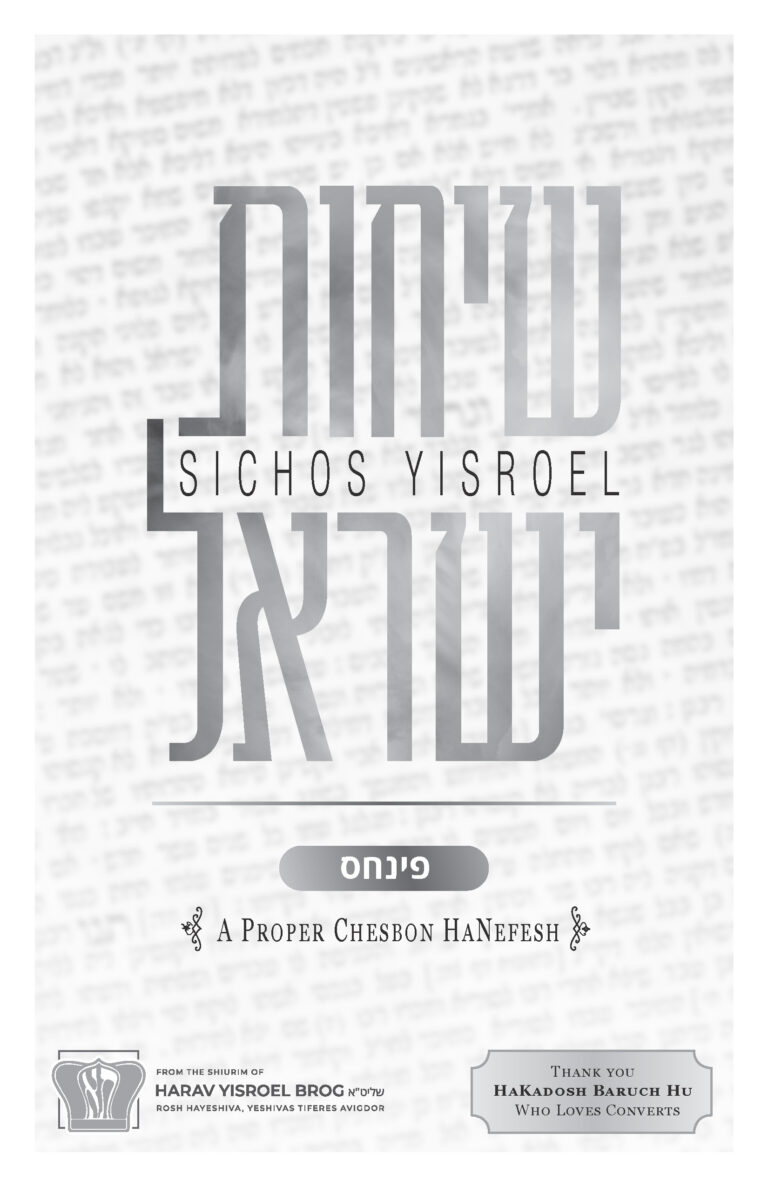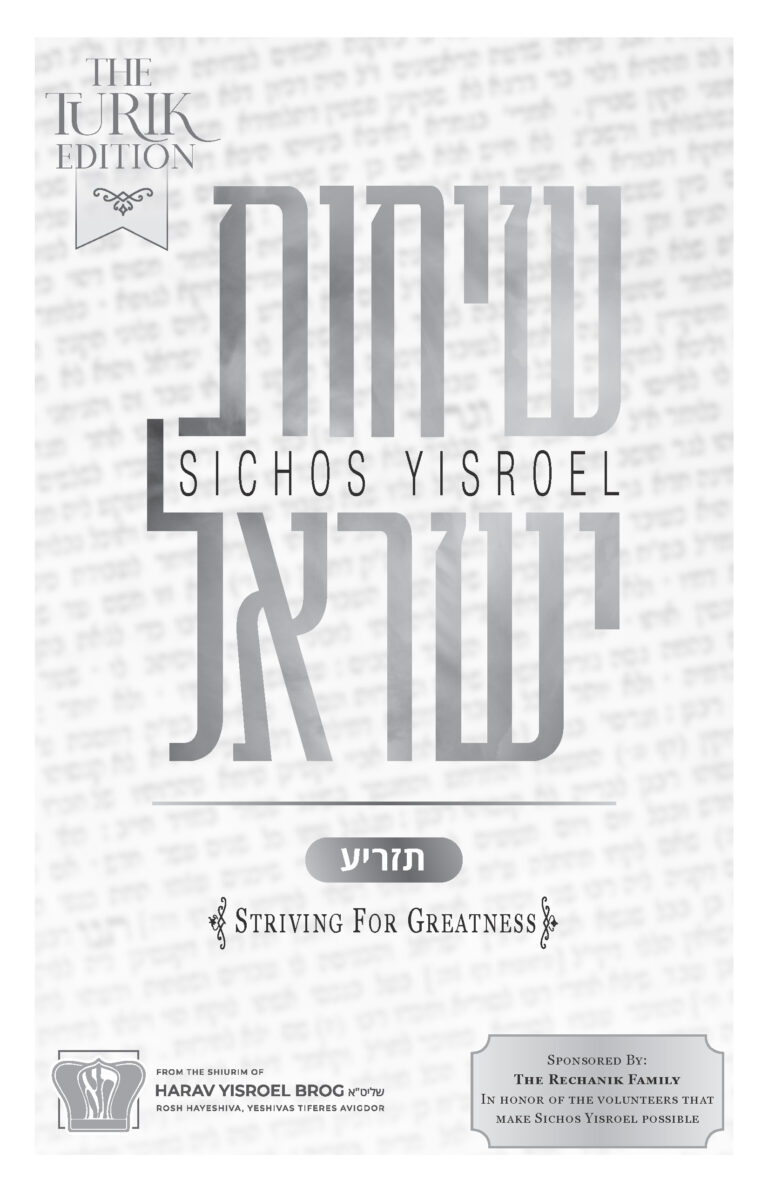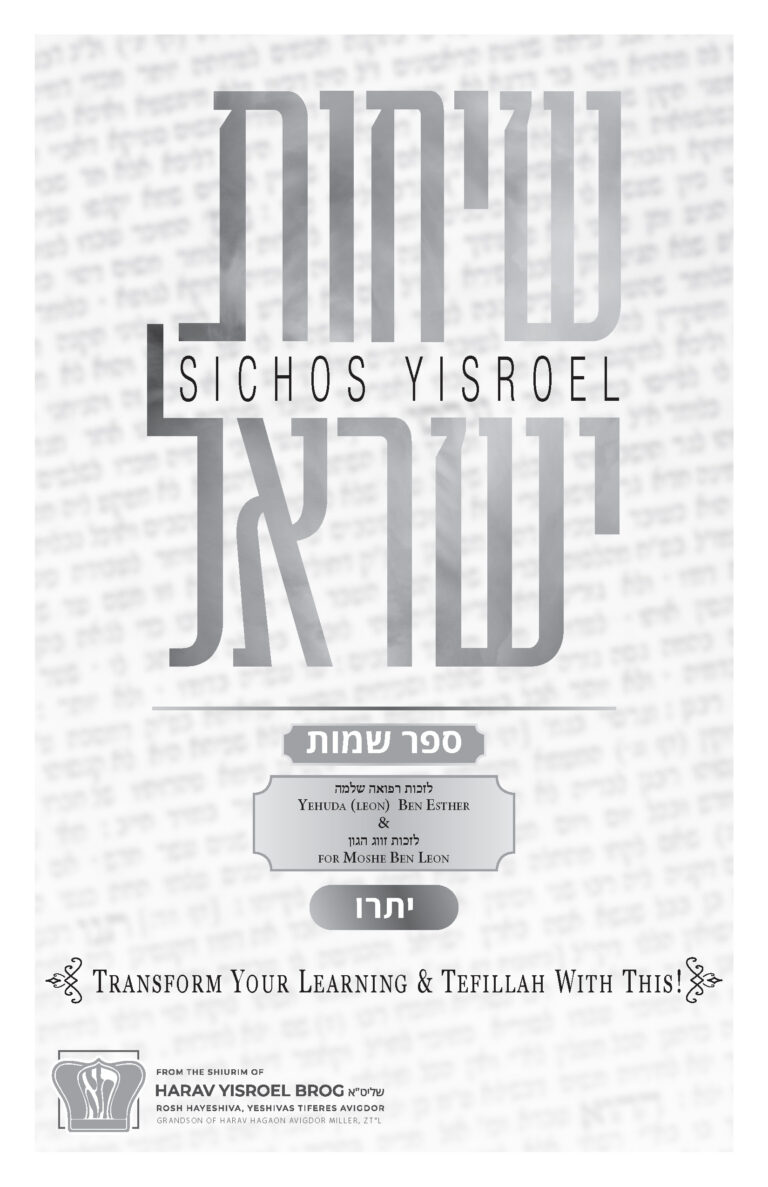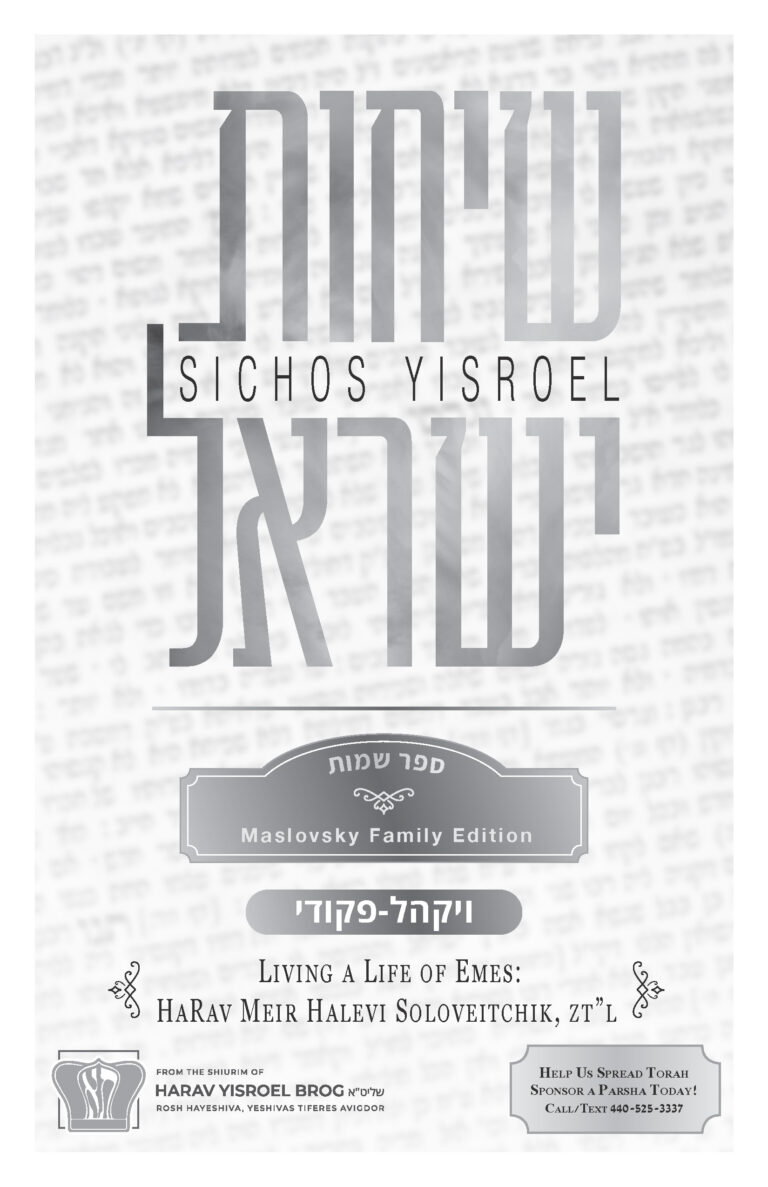Ki Savo 5782 – Hakaras Ha tov
Sponsored
In honor of our incredible parents, Dr. Yerachmiel and Wendy Green
By Their Children
Consider sponsoring a shiur
Visit YTATorah.org
Shiur presented in 5779
Parshas Ki Savo: Hakaras Hatov – 5779
A Mitzvah to Remember Hashem’s Chassadim
In this week’s parshah, the Torah teaches us about the mitzvah of bikurim. The Torah tells us that when you plant fruit trees in Eretz Yisrael, you’re supposed to bring the first of the growth to the Beis Hamikdash, to be given to the kohanim. These first fruits are unique because they’re brought to the kohen in the Beis Hamikdash, but they’re not offered on the mizbeach. They’re given to the kohen. The Torah tells us the very great procedure that we have to do. There’s a whole meseches Bikurim that talks about the process of how you have to tie a string around the first fruit that emerge, and when they ripen you have to put them in a basket and then you have to march to Yerushalayim with pomp. A most tremendous mitzvah!
One of the things you have to declare when you come to the kohen is that you have to say, “I am announcing today – by bringing these peiros of my land before Hashem – my shevach vehoda’ah, my praise and my thanks that I was zocheh to a chelek in Eretz Yisrael, that Hashem fulfilled His promise and gave me a piece of land and that He gave me these fruits.” And you also have to say, “I’m not a kofer betovaso shel Hakadosh Baruch Hu.” (Devarim 26: 1-11)
The first thing I want to share with you is that this is a parshah that talks about the mitzvah of hakaras tovas laBorei Yisbarach. Now, most of us think that we could relate to the mitzvah of hakaras hatov. I don’t know if there are many people, even leftists, who have a stand against this mitzvah. They may be kofrim because they don’t acknowledge that Hakadosh Baruch Hu gave us the land and the fruits and everything else. They may think: “We fought for it! We got it with our strong IDF and the sweat of our own labor and efforts.” The Torah tells us, however, that you’ve got to be makir tovah.
If you ask most people whether the mitzvah of hakaras tov is a worthwhile thing to do, they will answer, “Yes!” But you have to know that very few people actually do this mitzvah. Rabeinu Yonah says a very interesting thing. He says that Hakadosh Baruch Hu gave us mitzvos to help us attain ma’alos elyonos, very elevated heights, and the way that Hashem gave us these mitzvos that bring us to this great elevation are with mitzvos aseh, positive mitzvos. One of those positive mitzvos is to remember all the chassadim that Hashem did for you all your life and all the history of your family’s life. Remember all the chassadim of Hashem.[i]
I remember being blown away by hearing my zeida (HaRav Avigdor Miller, zt”l) relate chassadim that Hashem did for him when he was a baby. He used to say over an episode that happened when he was mamash a baby that he was climbing on boards that had nails sticking out of them and he slipped and he got his face embedded with nails. A board with nails got embedded in his face! He thanked Hashem from the bottom of his heart, saying as follows: “If one of those nails would have hit my eye, there never would have been an Avigdor Miller in the world.” He thanked Hashem over and over for that miracle! He thanked Hashem for many episodes that happened during his life.
He used to thank Hashem for what occurred after he left Yeshivas Yitzchak Elchanan. He was desperate to make parnasah. He was a very, very poor boy. His family had no money to support him, and he needed a job. He called up the old talmud Torah. In that talmud Torah he was a top boy, a top student. They didn’t even offer gemara, but he was taught one blatt of gemara. They taught him one blatt of gemara!
Rav Mordechai Gifter, zt”l, used to always say: “I can testify and I will testify that I remember your zeida who was older than me and he learned one blatt of gemara. On those hot and humid summers in Baltimore, your zeida would sit from after shacharis until minchah – the entire summer – learning that one blatt.”Could you imagine that? Moradig. “He used to sit and schukle a funny way when he learned. He used to keep his hands on the table (with elbows touching the table and hands pointing up), and he would shake back and forth like this.” In a short time, his shirt had very large holes under his elbows. His elbows were “playing” peek-a-boo. But he never stopped learning. It was a sight to behold. Rav Gifter was younger than my zeida, and watching this bachur do this, made a tremendous roshem on Rav Gifter!
Who Says This Job is For You?
My zeida needed parnasah. So he called his old rebbi and said, “I need a job.” His rebbi said, “Perfect! We’re looking for someone. Come on down. Let’s meet.” My zeida came down. He was perfect for the job. He walked into the office, and he saw another guy waiting there. He looked at that fellow. That fellow was one of the weakest students in the learning program. So my zeida asked him, “What are you doing here?” The fellow said, “I’m applying for a job.” My zeida said that he smirked and said to himself, “He’s not going to get the job; maybe cleaning the place, but he can’t be a rebbi.” Then the other guy was called in first for an interview. As soon as he came out, my zeida started to get up to go for the interview. The rebbi told him, “There’s no job available. It’s been taken.” My zeida wasn’t even interviewed. He was in shock. What?! That guy?! But because he did not get that job, he went to Europe to learn in yeshivah and became Harav Hagaon Hatzadik Rav Avigdor Miller! “I thank Hashem,” he said, “for that chessed nifla.”
He said that another time he heard his parents talking about how they had no money. My zeida used to sit under the table and devour books. He was a voracious reader. He was a young boy, maybe 12. He decided he’s going to help the family out and get a job. He heard they were hiring across town, so he walked across town to get the job. As he put his foot on the bottom step, someone’s hand came out of the door and pulled the sign saying “Looking For Workers” to the inside. Mamash, when he had his foot on the steps! He said that this saved his life. If he would have been there, he never would have pursued any higher studies, he said.
To Be “Makir” Means to “Understand”
I want to tell you, this mitzvah is a very, very difficult mitzvah because even though people subscribe to gratitude, nobody has gratitude whatsoever. Gornisht. Nada. Klum. Efes. Now, does that mean I don’t appreciate when Hashem does something good for me? No. Of course I appreciate it! I have never yet met a person in my life who wants something bad to happen to him. But no one is makir tovah. The mitzvah of hakaras hatov is to be makir. You know what makir means? Makir means to understand. Makir means to get to know.
I was walking in the street recently, and I saw a fellow walking with a white stick. I started to watch him, observe him. I noticed there was a big light pole nailed into the sidewalk. I was thinking, “I wonder what this guy is going to do now.” He managed to get around it, but it was pretty scary for me. I’m watching him thinking, “Wow, I have eyes!” Now, if I would have gone across the street to that guy and said to him, “Buddy, I have a way I can get you an eye. Two is too much to ask, but I can get you one eye. What would you be willing to pay or do for that one eye?” I’m sure the guy would say, “Anything.” I can’t imagine not.
Now, do I feel like Hashem gave me two eyes? Not at all. Am I entitled to two eyes? No. Do I deserve two eyes? No. Did I ever look at something or somebody that I wasn’t supposed to look at? Did I ever look at somebody and form a negative view of that person? Did I ever look at a person who was a chashuve person and criticize him because of something I saw him do? And if I wouldn’t have seen it, I would have never been able to pass any negative judgment about him and would have talked very little lashon hara! I remember thinking that I would become a silent being if I didn’t have eyes. What would I speak about?! Is there a pole in front of me? Is there anything in my way? Could I walk the next hundred feet and make it there without tripping in any potholes? You would never say or do a bad thing. It’s amazing! How many bad things did you do with your eyes?! And despite all of that, Hashem gave me eyes! Am I makir tov for that? No. Sure, I’m somewhat thankful and grateful, but am I really grateful? No.
If somebody would come to me and say, “Rabbi Brog, I enjoy listening to your shiurim. I would like to give you a personal gift of $100,000 cash.” Now, I wouldn’t say, “That’s all?!” I would say, “Could you repeat that again?” The guy would say, “I’d like to give you $100,000 cash.” Taka, that would seem to me very generous. It’s a very generous offer. I probably would shake his hand like it was a lulav. I’d probably give him a hug and not let go of him too fast. I probably would say to the fellow, “I want to get to know you better. I’m never going to forget this for the rest of my life.” I’d be overwhelmed with excitement! I wouldn’t want to stop talking about this! I would be filled with joy and excitement, and I would feel it!
One of the Highest Mitzvos
And here Hashem gives me a thousand times more than that! Am I excited about it? Do I feel it? No. We are swimming in an ocean of tovos from Hakadosh Baruch Hu, and we’re such fools that we’re seeking dribs and drabs of kindnesses. Imagine a guy is swimming in an ocean and somebody says to him, “You look like you’re looking for something. What are you looking for?” The fellow says back, “I’m looking for some water?” “Water? You’re swimming in the water!” That’s really us.
That’s why hakaras hatov is a very difficult mitzvah, because to be makir the tovah means to invest efforts beyond your imagination. This is one of the ma’alos elyonos, one of the highest elevated levels that a Jew could reach. If it was easy, everybody would be doing it. It would be nothing. It’s not easy. It’s narishkeit when people think it’s easy.
Now, I want to tell you another thing. Let’s say somebody would come to a blind man and tell him, “I would like to give you eyesight in one of your eyes.” Do you think the guy would say back, “I want you to know that I’m suffering from athlete’s foot and my toes really bother me. Do you think you could do something about that?” No. The guy who’s offering the eye would say, “Right now, I’m only an eye man. In my suitcase, all I have is eyes. I have artificial eyes. I can give you an eye, but I don’t have anything for an athlete’s foot.” Do you think the guy would get sad? He would say, “You know what? Forget the athlete’s foot. Those smelly feet, forget about that. I’m going to get an eye!” Today, we are the kind of people that if something is going wrong in our lives, all the tovos that Hashem gives us is nothing, just because there’s something going wrong in our lives!
Why Hashem Pours Chessed On Us
Now, Hashem created a situation where He pours tovos upon us nonstop in every single prat. Do you know what that serves? It acts as a tremendous protection for us – because when something is not going right in your life, you should have a way of how to deal with it. When someone is having fun, like when you see a kid playing basketball, a little silly game, or baseball, and the guy is into it and the guy is running around those bases and he hits his foot against something and it gives him a big gash, do you know what that guy does? He doesn’t stop. He keeps on running! When he gets to that base, then he looks at his foot to see what’s going on. And he just says, “Ah, whatever.” He just wipes it up and goes on. He hears everybody announcing, ”Yay! Yay! Yay! You hit a double!” So this kid is not even thinking about his small injury. This silly little tovah or excitement during the game or this little ego trip he received, makes him be mesiach da’as from all his tzaros.
We don’t feel anything. You know what we feel? When things are not perfect for us. If I’m missing $100, or even if I’m missing a few prutos, then I can’t enjoy myself anymore. Then I feel that my life is over. I go into depression. I get down. I complain. That’s how people are.
The number one of hakaras hatov is to focus on the myriads of tovos you receive from Hashem,to be margish these tovos, to feel them, becauseif you don’t feel the tovah, you have no hakaras hatov.
Focusing on the Tovah We Receive
Let’s give another example. Can you imagine the following? Let’s say a guy is collecting money for a mosad, and this guy gets 50% of whatever he collects. It’s not unheard of for a meshulach to make 50% profit. Now, let’s say he meets a gvir. The gvir takes him in. He’s mechabed him. He writes him a check for $180,000. That guy is going to be not stam tickled pink. He is going to be shiker with $180,000. Nothing is going to bother him. He just made himself 90 grand with a little gift of gab, some smooth talking. The guy pocketed 90,000 big ones. That guy is going to think of all the possibilities that he now has. He’s never going to forget that gvir for the rest of his life.
Now, what if this meshulach says the following: “That’s it?!” The gvir says, “Huh. What did you say?! That’s it?” And the guy would say, “Let me explain what I mean. If you’re giving 180 grand, you must have very deep pockets, so why don’t you give me 360 grand?” Now, most gvirim would blow up in the guy’s face and tell the guy, “I want you to know something. I happen to know that you pocket 50% of the money, you chayah ra’ah that you are! I gave you 90 smooth ones in your pocket and you want to know why I’m not giving you 360?!”
Let’s say this gvir would say, “Okay, fine. How are you doing? What else is new?” “With regard to what?” the meshulach asks. So the guy replies, “I just gave you 90 smooth ones in your pocket! I gave you 90 for the mosad. You’re going to get kavod. You’re going to get everything from this. And that’s how you thank me?” “But I said ‘thank you.’ What do you want me to do for you already?” The gvir says back, “For that kind of money I expect to get a little more than a ‘thank you.’ I want to see a smile from ear to ear. I want to see a cheeseburger smile on you. I want to see saliva coming out of your mouth. I want to see you get excited. After what I just gave you, I changed your year! I made a life change for you!” The guy says, “Well, I appreciate it. I didn’t say I don’t appreciate it. I told you I appreciate it. I said ‘thank you.’” You would want to kick the guy in the teeth if he says such things!
Painful Reminders Are Opportunities
Hashem gives us life. He gives you hearing. He gives you a mind to think. He gives you eyes to see. For me, it’s a peleh when a guy calls me up and tells me, “I have a problem.” You know what my first thought is? You only have one? You’re very lucky that I’m not Hashem, because if I were Hashem, you’d have only one thing going right for you. Maybe the tips of your earlobes – I wouldn’t make them painful, but everything else I would squeeze you like in a vise. I would take your back, and you’re going to think that you’re in the Inquisition. That’s what you would think. You know why? Hashem says, “I kept that back of yours in shape, that complex back with a spinal cord, with so many connections to the lower part of the body and it’s so delicate – for years and years! One little slip and you mamash have pain.” I’m sure you saw people with back pain. I’ve seen people with back pain. Ahhh! They can’t walk. They can’t live. They mamash feel like their life is not shaveh. Pain shooting down their feet. Pain shooting into their knees, into their hips. There’s nothing they could do! They have to live with it. It’s not for five minutes. These things don’t come and go. Oh no.
When I was younger, I used to have back pain. It started when I was a kid when I was playing a game and the way they hurt me, my back folded up. When it folded up I lost my breath. I couldn’t breathe. I felt like somebody crushed me. I thought I was going to die. After that I had back pain. I asked my grandfather about it. He said, “Why don’t you thank Hashem for your back?” I said, “I do.” He said, “Really? How? Saying, ‘I don’t mind if my back doesn’t hurt,’ that’s not called thanking Hashem. You should be excited.” And from that day on I thanked Hashem for my back. When I hear somebody has a back pain, I tell Hashem, “I got Your message. I hear You loud and clear.” Not stam.
Taking Your Knees and Hips for a Tune-up?
I was talking to a person whose job was lifting things. He can’t work anymore. A young man. He’s finished. Hashem shut him down. He used to always pride himself that he’s a bulvan (strong man). “I can carry anything, fifty steps, sixty steps. I can carry it here and there,” he used to tell me. I said to him, “You better appreciate what Hashem is doing for you.” He didn’t. Now, he can’t carry anything. Laid up in bed for months and years, spending his life running from doctor to doctor. Why don’t you thank Hashem for this? People don’t realize this is what it’s all about.
Let’s talk about your knees. Your knees are walking nonstop. I remember taking a walk with my grandfather, and at one point he started moving his hands like this. He said, “Yisroel, do you hear anything?” I said, “Hear from where? Do I hear your hands talk, Zeida? What am I supposed to hear?” He looked at me and said, “No, listen over here (he started to rotate his shoulder joint). Do you hear anything?” “No,” I answered. He said, “Do you hear anything coming from my hips? I’m 70 years old!” he told me. “For 70 years my hips have been grinding. My elbows never stop moving back and forth. I never brought it one time into the ‘shop’ for a tune-up, to get it lubricated. Hashem took care of everything,” he said. “You know how thankful I am to Hashem? That’s amazing. My fingers. Look how my fingers work,” he said. “They are so delicate, the tendons. So many people suffer from that, you should know. Do you know what kind of chessed Hashem that is?”
And Hashem is talking to us all day long. How come your eyes start to hurt you? Or you get a headache sometimes. What do you think your headache is? Hashem is saying, “You better thank Hashem that you don’t have headaches.” Because I’m sure everybody knows somebody here or heard of people or knows people who suffer from migraine headaches. Those are nightmare headaches, and there are so many different types of migraine headaches. It’s mind boggling how many types there are. Not just one. I used to think, “Ah, I got a headache. Okay.” No, you don’t thank Hashem. You also never get excited. They’re all shlepping around. They’re dragging themselves through the streets. Unless they want to do an aveirah. If they’re going to do an aveirah then they look excited. If I see a bachur who looks like he’s running somewhere, I know one thing. He’s running away from the yeshivah. You don’t run to the yeshivah excited. It’s a funny thing. I don’t see balebatim running to shul excited. When they’re leaving shul, they’re always in a rush. Then, you see a little bit of chiyus. But until then – nothing. A guy will go into a restaurant and he’s excited. When they are going in to shiur, they’re coming one by one.
A mentsch has to know that this is what hakaras hatov is. You have to be makir Hashem’s chassadim in your life.
Going Down the List of Chassadim
Now, the way to do it is to focus on one thing at a time. I would suggest that what you should do first is close your eyes. That’s what you should do. Close your eyes and try to walk for five minutes in a place you’re familiar with or go outside and try to walk for sixty seconds. Take a stick in your hand, or act like you have a stick. You won’t know where you’re going. You’ll bump into things, trip over things. Even on a street you’re very familiar with!
Think of earaches for a moment. Do you know one of the most common maladies that children suffer from is ear infections? Every second kid has an ear infection. You take the kid to the doctor and the first thing the doctor does is he sticks something in the kid’s ears and starts looking in his ear. You know what kind of chessed it is not to have an ear infection? Parents stay up all night and the kid cries. You hold him and try to make his booboo go away, and the parents never once got the message – you never thanked Hashem for your ears, so now Hashem is giving you the opportunity! He’s giving your kid an earache and He wants to see if you can be makir tov that you have healthy ears.
Do you ever thank Hashem for not having sore throats? You think you have hakaras hatov? You’re a kafoy tov because you walk around like sour grapes. You should walk around flying high. You should think about the chassadim that Hashem does for you.One night of no sleep – do you know what that does? You know what happens to most human beings? They become lost. They become disturbed human beings. One night of no sleep. One night! You still have 364 nights. One night you won’t have sleep is not a big deal.
So the first thing is to be makir. Be makir. I look around at people and I see their issues and I see their problems. Some people have issues with Yiddishkeit. That’s tragic. You’re a Yid. You have no choice. I thank Hashem that I don’t have this challenge. I see a person who has a problem. He’s mentally incapacitated, for example. The guy is up the pole and down the pole. The guy is up and down and all around. It’s very hard to say that he’s stable. It’s a terrible thing! I see people whose mental faculties are very shvach. I see people who look funny, who have ears sticking out. You see a person without a chin. Have you ever gone into a shul and seen a person without a chin? You’re thinking what a nebach. That guy has to walk in the street like that, and every single person is looking at him. Now if that guy came to me and said, “Everybody is looking at me,” you know what I would say? I couldn’t say, “You’re imagining it.” I would say, “You’re right.” I would say to the person, “Thank Hashem that your ears are in their place and that your nose doesn’t stick out also.” Do you ever thank Hashem for that? You know how many people get discombobulated when something is not 100%? You know how much cosmetic surgery is going on out there to rearrange cleft lips, noses people don’t like, ears people don’t like, chins people don’t like. We have to thank Hashem and you have to be excited. If you walk around looking sad, you’re not a mentsch.
Could you imagine if a guy gave you 90 grand in your hand and you walked around looking like sour grapes? People would think, “What are you, a meshugene? You’re not happy?! The guy gave you 90 grand and you’re not happy?! You’re not even smiling?! Sit up taller. Take a little quick step in your feet, like a mentsch.”
That’s what a mentsch has to know. If a person knows that, a person stands a chance. You have to say it out loud.
Counting the Blessings Now, to Help Us Later
I want to share with you an important lesson from the Chafetz Chaim. He said that one of the problems people have is that sometimes a person is living during a tumultuous time, at a time where there’s no peace around him. They become preoccupied with life’s stresses. One result of that is that they do not know how to notice and accept the tovos that Hashem pours on them, and they don’t know how to react in the correct way. Instead of focusing on the good things they have they only see the problems.
An extreme example was the Holocaust era, but tumult really started before the Holocaust, before the Jews went to the camps. There were years of persecution. They promulgated new laws against the Jews everywhere. Hashem was squeezing the people.
Nowaday, too, people have all kinds of metzukos, pressures. People have inner pressures. People have family pressures, shalom bayis pressures, children pressures. Here is a man who came collecting here last week. A tragedy. His son was arrested in Russia. He’s here now trying to raise money. I asked him, “Tell me, Reb Yid. (He has fourteen kids and tzaros in every part of his life). What was your kid arrested for? Was he learning Torah? Was he arrested in Russia for keeping the mitzvos?” He said, “No. He was arrested in Russia for drugs, for samim.” I said, “Oh, he’s a tzaddik.” “No, no, no medical marijuana.” I said, “I know people on medical marijuana. What does he need medical marijuana for?” The father said, “Oh, now that you’re asking. He was riding a motorcycle.” A real yeshivishe guy. He was riding a motorcycle too fast and he had a motorcycle accident. That’s what happens to most people who drive motorcycles. Motorcycle accidents are not uncommon. A number of doctors who work in hospitals told me that as soon as the summer season comes they get excited because they know now they’re going to have a lot of surgeries to perform. They don’t call them motorcycles. You know what they call them? ‘Donor cycles.’ That’s what they call them. A doctor told me one time, “If I walk down the street and I see a motorcycle going ‘vroom, vroom’ around me, do you know what I think to myself? ‘I wonder when I’m going to meet this guy and be able to donate his heart to some other person who could use it in a wise way.’”
So this man’s son was driving a motorcycle wildly, but he didn’t die from the motorcycle. He got banged up and from then on he has chronic pain, and the only thing that helps for his pain is medical marijuana. This nebach boy. I said, “How old is your son?” “My son is 30 years old.” I said, “Your son is 30 years old?! That’s not a little boy. That’s a man. A 30-year-old. He’s an adult male that acts like a baby. Is he married?” I asked. “No, he’s not married.” I said, “I understand already.” A problem son, a problem case. The point is that this father with fourteen kids is, nebach, now forced to travel around the world to raise funds for expenses related to this problem. It’s heartbreaking. But did you ever think about how kind Hashem is to our children that we don’t have this problem? You don’t think about that.
So people have all kinds of pressures, and those pressures usually create an irrational pressure on a person’s mind, as he becomes totally preoccupied. Any person going through shalom bayis or a story like this with a kid, or a kid who’s sick, has a hard time. Every person in his life experiences worries, yesurim, da’agos, tirdos. Everybody has these worries, whether himself or his mishpachah, his banav, benosav, his kids. That’s a normal thing. It’s very rare that a person does not experience any of these challenges. It’s unheard of. So this creates a special challenge for a person. What happens is that the person does not know how to accept these things and he doesn’t know how to react to them. Then you tell the guy, “Why don’t you think about the fact that so much good is going on in your life?” But a person doesn’t do that. He erases all the good and he only focuses on the bad. And that’s what a person has to know, says the Chofetz Chaim. For every person Hashem, first, fills his coffers with tremendous tovos. That’s what Hashem does. If you would have used the tools, by acknowledging these tovos and thanking Hashem for them- when everything was going well with you – so when you have a little challenge, it wouldn’t have that impact on your life and destroy your existence.
Hakadosh Baruch Hu should help us learn how to recognize and to feel this, as this is the key. Feel the tovah that Hashem is giving you, be makir that tovah! When Hashem sees somebody walking around sad, Hashem is extremely disappointed. Let us learn this lesson, and be matzliach.
[i] ודע כי המעלות העליונות נמסרו במצות עשה. כמו מעלות הבחירה שנאמר (דברים ל׳:י״ט) ובחרת בחיים. ומעלות תלמוד תורה שנאמר (דברים ו׳:ז׳) ודברת בם. ומעלות לכת בדרכי ה’ שנאמר (שם כח) והלכת בדרכיו. ומעלות התבונן בגדולת ה’ שנאמר (דברים ד׳:ל״ט) וידעת היום והשבות אל לבבך כי ה’ הוא האלהים, ודוד אמר (תהילים י״ד:ב׳) ה’ משמים השקיף על בני אדם לראות היש משכיל דורש את אלהים, ומעלות זכרון חסדיו והתבונן בהם שנאמר (דברים ח׳:ב׳) וזכרת את כל הדרך ונאמר (דברים ח ו) וידעת עם לבבך כי כאשר ייסר איש את בנו יי אלהיך מיסרך. ודוד אמר (תהילים קז מג) ויתבוננו חסדי יי, ונאמר (תהילים כו ג) כי חסדך לנגד עיני, וכו’ (שערי תשובה ג׳)
